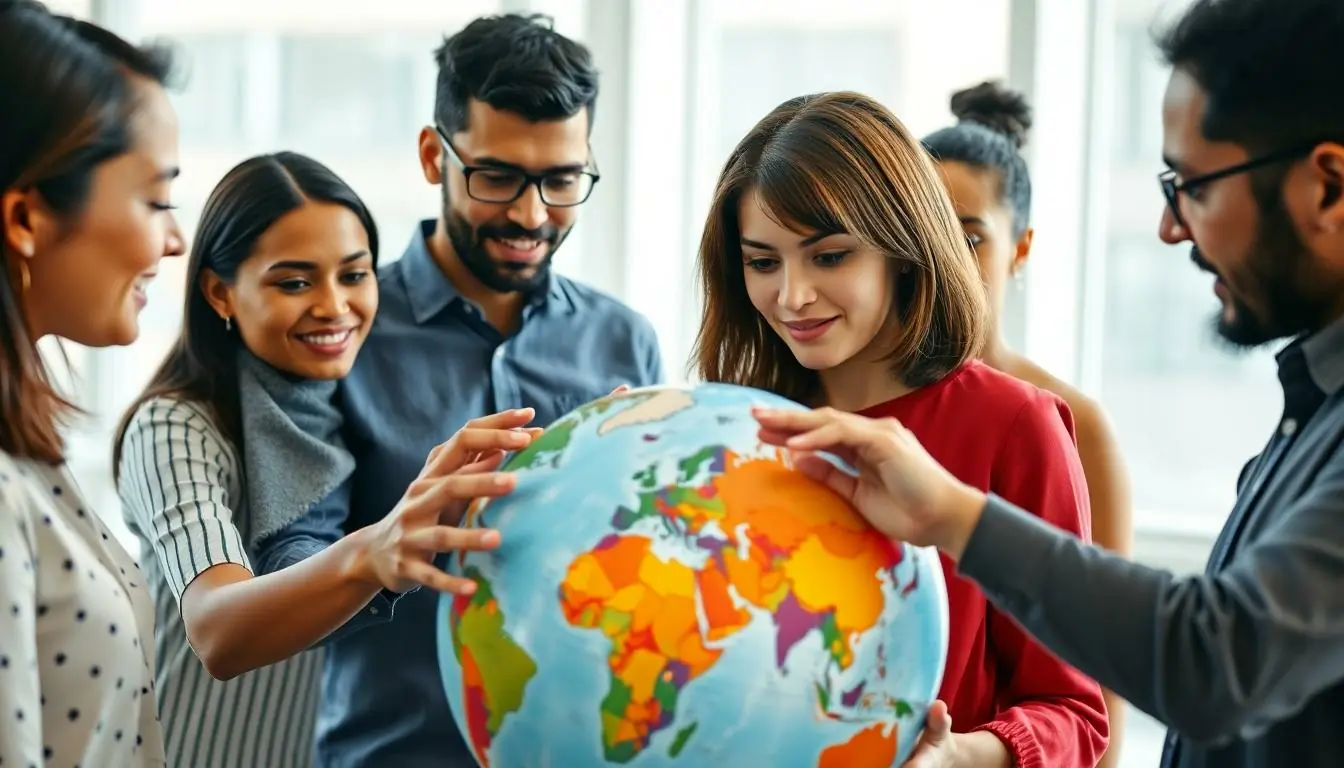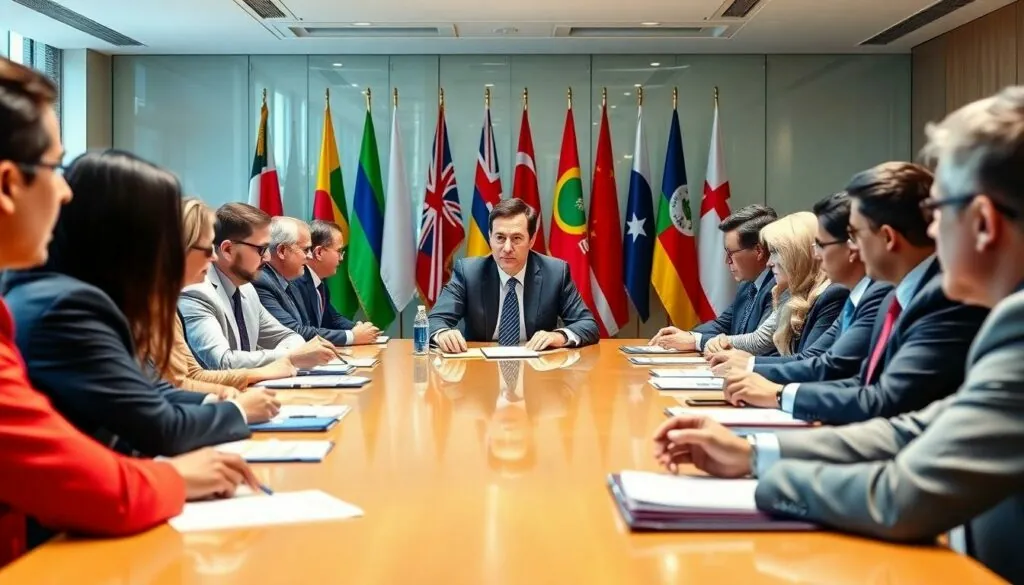Table of Contents
ToggleIn a world that seems to spin faster every day, understanding global affairs is like trying to catch confetti in a windstorm. It’s not just about politics or economics; it’s about how nations interact, collaborate, and sometimes clash over issues that affect us all. From climate change to trade wars, global affairs shape the very fabric of our lives, whether we realize it or not.
Understanding Global Affairs Meaning
Global affairs refer to the interactions among nations on economic, political, environmental, and social levels. It emphasizes the complexities inherent in how countries engage, cooperate, or clash over pivotal global issues.
Definition of Global Affairs
Global affairs encompasses multiple aspects, including international relations and transnational challenges. This field examines diplomacy, trade agreements, military alliances, and cultural exchanges. Moreover, critical global issues, such as climate change and human rights, fall under its purview. By analyzing these dimensions, individuals and policymakers gain insight into global trends and the interconnectedness of nations.
Importance of Global Affairs
Global affairs play a crucial role in shaping local and global policies. Understanding the dynamics of international relations helps countries address pressing issues like poverty and migration. Insights into global affairs empower citizens to make informed decisions that impact their lives. Engaging in discussions surrounding global challenges fosters cooperation and creative solutions among nations, ultimately influencing economic stability and peace.
Key Components of Global Affairs

Global affairs encompass various elements that shape international interactions. These include political, economic, and social aspects that influence how nations operate together.
Political Aspects
Political dimensions play a crucial role in global affairs. Nations engage in diplomacy to foster relationships and resolve conflicts. International organizations like the United Nations facilitate dialogue and cooperation among member states. Furthermore, treaties establish rules governing state behavior, affecting peace and security. Military alliances also enhance collective security, deterring aggression. Regional conflicts can disrupt global stability and require collaborative efforts for resolution. Additionally, public opinion and activism influence political decisions, as citizens advocate for change in their countries and beyond.
Economic Factors
Economic factors significantly impact global affairs. Trade agreements enable countries to exchange goods and services efficiently. They foster economic growth and create job opportunities. Global supply chains facilitate international commerce, linking manufacturers and consumers across borders. Currency exchange rates influence trade dynamics, affecting the cost of imports and exports. Economic sanctions can serve as leverage in political disputes, impacting nations’ behavior. Furthermore, international financial institutions like the World Bank provide support for development projects, promoting stability and growth in underdeveloped regions.
Social Dimensions
Social dimensions of global affairs are equally important. Cultural exchanges promote understanding and strengthen connections between nations. Human rights advocacy highlights the need for equity and justice worldwide. Migration patterns illustrate the movement of people seeking better opportunities and safety. These social issues often reflect broader economic and political challenges. Global health initiatives address public health crises, emphasizing the interconnectedness of nations. Education and technology transfer enable knowledge sharing, fostering innovation and collaboration across borders.
Global Affairs in Practice
Global affairs manifest through various real-world applications and interactions among nations. These interactions reflect challenges and solutions pertinent to global society.
Case Studies
Examining case studies provides insights into complex global affairs. The Paris Agreement illustrates how countries unite to tackle climate change. Participants commit to reducing greenhouse gas emissions, showcasing cooperation amidst differing national interests. Another significant case involves trade wars, particularly between the United States and China. Tariffs imposed on goods demonstrate how economic policies directly affect international relations. The Syrian conflict serves as a poignant example, highlighting humanitarian crises and the international community’s responsibility to respond. Each case reveals the intricate dynamics of diplomacy and negotiation.
Organizations Involved
Numerous organizations play pivotal roles in shaping global affairs. The United Nations (UN) works towards fostering international peace and security through collaborative efforts. Various specialized agencies under the UN address issues like health, education, and human rights. The World Trade Organization (WTO) facilitates trade negotiations, ensuring fair practices among member nations. Non-governmental organizations (NGOs) such as Amnesty International advocate for human rights, influencing policies and raising awareness. Regional organizations like the European Union (EU) promote economic integration and social cooperation among member states. Together, these entities form a network critical for addressing global challenges.
Challenges in Global Affairs
Global affairs face numerous challenges, significantly impacting international relations and cooperation among nations.
Geopolitical Tensions
Geopolitical tensions arise from competition for resources and influence, leading to conflicts and instability. National interests often clash, particularly in regions rich in oil, minerals, or water. For instance, the South China Sea exemplifies territorial disputes creating friction among neighboring countries. Power struggles between major nations like the United States and Russia further complicate diplomatic relationships. Escalating threats such as military buildups and proxy wars add layers to these tensions. Resolving these issues requires dialogue and negotiation, emphasizing the importance of diplomacy.
Economic Disparities
Economic disparities between nations hinder global cooperation and exacerbate social tensions. Wealthy countries often possess advanced technologies and robust infrastructures, leaving developing nations at a disadvantage. Trade imbalances contribute to these inequalities, restricting access to essential goods and services. For example, unequal access to COVID-19 vaccines highlights disparities in healthcare. Such differences can lead to increased migration as individuals seek better opportunities. Multilateral organizations, like the International Monetary Fund, play a critical role in addressing these disparities. Fostering equitable economic growth is vital for addressing these global challenges.
Understanding global affairs is vital for fostering a more interconnected world. It shapes policies that address critical challenges and influences the dynamics of international relations. By recognizing the complexities of cooperation and conflict among nations, individuals can better appreciate the impact of global issues on their lives. Engaging with these topics encourages informed decision-making and promotes collaborative efforts to tackle pressing concerns. As the world continues to evolve, staying informed about global affairs will empower citizens to contribute to a more stable and equitable future.







